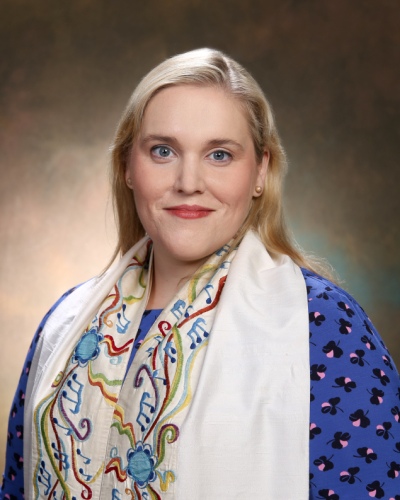There is an article in this month’s issue of Reform Judaism Magazine entitled “The God Survey”, where Rabbi Mark Dov Shapiro of Temple Sinai in Springfield, Massachusetts explores the results of – you guessed it – a survey on beliefs about God.
Bothered by the one-sidedness of the pulpit, Shapiro explains that he longed to hear what his congregants believed about God, not simply to preach his own beliefs and what tradition teaches. On Erev Yom Kippur, before Kol Nidrei, Shapiro asked his congregants if they would take ten minutes to complete an online survey about their God beliefs. He wanted to know what they really believed in their hearts.
We learn from various studies conducted in recent years that there is an epidemic of arrested theological development among Jewish adults. Somehow, many Jewish adults remain frozen in their beliefs about God, stuck right where they were around the time they became bar or bat mitzvah or in the unbelieving rejection of God’s existence that often comes in late adolescence.
Philosopher Paul Ricoeur explains that there is a natural and healthy development of spiritual belief: first we believe everything at face value, then we reject it all as false, and finally we come to understand what we were first taught as sophisticated symbols used to engage in and interpret our beautiful and mysterious world. All too often, however, Jewish adults are not making it to Ricoeur’s final stage, called a second naiveté.
I read Rabbi Shapiro’s article in print a few weeks ago, but it was not until today when a link to the article appeared in my inbox, buried in the thread of the American Conference of Cantors list serve, that I took the God survey myself. Now, it should come as no surprise that I think a lot about God. I think about what I believe and what centuries of our people’s sages believed. I think about what I believed about God as a child laying in bed at night, what I believed the first time I learned what the words of our prayerbook Hebrew really meant, and what I believed through periods of great personal struggle. I think about the evolution of my own beliefs and my deep desire to remain ever-dynamic in my thinking.
Despite all of this times spent thinking about my own beliefs, when I took the God survey, I got stuck on one question. I wasn’t sure what I believed. Thankfully, there was an option on the survey to say, simple, “I don’t know.” I am so glad that I didn’t know my own answer to that particular question. That question will now be my catalyst to read, study, and push myself more to learn the contents of my own heart and mind.
Sometimes it takes something like a very thoughtful survey to push us forward, further toward spiritual maturity and nearness to God. Often, we need other people to ask us hard questions so that we can say “I don’t know” and head out on the quest to find our own answers.
I encourage you to read Rabbi Shapiro’s article here. But most importantly, follow this link to complete the URJ’s national God survey.
~Cantor Mary





7 Responses
Thanks for the encouragement. I took the survey, but I must say that I do not see it as likely a valid instrument. The vocabulary of the survey is essentially theistic and there are many ways to believe or be religious outside of classical theism. From my perspective many of the questions were baffling and some I sadly characterize as one or more of (1) ignorant of non-theistic religion, (2) indifferent to non-theistic religion, (3) uninformed, or (4) silly. It also appears unlikely to me that any social scientists or anyone with real experience creating valid instruments had a hand in the creation of the survey. I doubt that anything meaningful can be derived from it. I think the best use of the survey would be a study session in which people could discuss it (without answering it) and perhaps discover why the survey is likely to produce non-significant, maybe even insignificant, results. Religion and belief are much more complex than can be measured by that device.
I like the use of this survey to encourage folks to think and talk about their beliefs. I don’t believe that any survey can accurately measure faith and the Rabbi talks about his assessment of a successful survey. How wonderful it is to be a part of a community that wrestles with these questions and how nice to not feel alone in considering my own.
At a recent dinner with friends from TBE, someone asked who had taken the “God Survey” referenced in Reform Judaism Magazine and Canton Thomas’ blog. I reviewed the information the next day but decided taking the survey and offering any comments were more appropriate for a Shabbat afternoon.
I applaud Rabbi Shapiro for using the survey as an attempt to understand better the range of beliefs of the congregation. Should TBE implement such a survey of congregants? Yes. I also agree with David Powers that the survey might be better suited as a discussion document for a seminar. Might be interesting topic for a say 3-session class at Beth El University or as a seminar during High Holy Days.
I also agree the survey needs some revisions. Part of my frustration is doubtless a product of my experience. For more than a decade, the research arm of a major company reported directly to me. As such I am sensitive to how wording of questions and limiting choices can bias results, albeit inadvertently.
Many of the questions would be more meaningful with the appropriate framework.
For example, replacing the first question, “I wonder about God?” (“A lot,” “A little,” “Rarely,” “Never”) and the second question, “I have questions about God?” (“Frequently,” “Rarely,” “Never”) with such questions as “I believe there is a God” with the follow-on, “I think of God as…” provides a framework to interpret respondents’ subsequent answers.
One more suggested change. To allow respondents to express opinions more accurately, rather than limiting selections to “Agree,” “Disagree, “Don’t Know,” provide a scale of 1-10 along with “Don’t Know.” I appreciate fully it is more time consuming to interpret questions with open-ended answers and/or 1-10 scales. However, from my experience the benefits far outweigh the additional work. Respondents feel as if answers reflect opinions more accurately and those reviewing inevitably discover opinions not expected.
Next step: I will help reword the survey and tab the results if someone can lead the seminar.
I think John has caught the problem with the survey. I do not expect it to provide meaningful results, even if the data look like something. However, the discussion it can generat–as a series of questions rather than as a survey–could be very useful and engaging.
I couldn’t agree more with each of you. The survey is flawed – for all of the reasons that you list, John, and more. But, look what has been accomplished because of its existence? So very many TBEers and Reform Jews around the country are engaged in thinking and talking about their personal beliefs! It matters not what data this device generates, only that it serve as a catalyst for individual’s own God wrestling.
I agree with David Powers. Many of the questions were stated in such a simplistic manner that there was no way to answer them in a meaningful way. Some presumed a God with will and intention, an presumption with which many of us do not agree.
I took the survey & I agree with the comments from Mary, John & David and Jeffrey. I do think John and David have a seminar to plan. Sign me up!